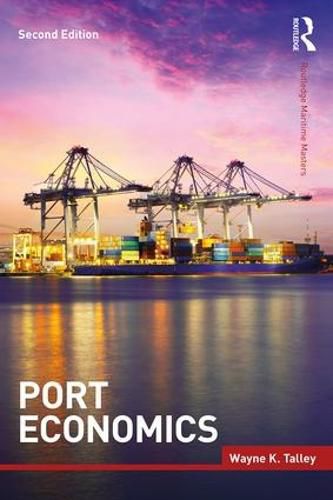Readings Newsletter
Become a Readings Member to make your shopping experience even easier.
Sign in or sign up for free!
You’re not far away from qualifying for FREE standard shipping within Australia
You’ve qualified for FREE standard shipping within Australia
The cart is loading…






Port Economics is the study of the economic decisions (and their consequences) of the users and providers of port services. A port works as an engine for economic development. This book provides a detailed discussion of port freight service users, such as freight water and land carriers, that have their ships and vehicles serviced and their cargoes unloaded by ports, as well as passenger services such as ferry carriers which are serviced by ferry passenger ports.
This text continues to enhance our understanding of port economics by exploring the economic theories, supply and demand curves, and the actual and opportunity costs relating to the carriers, shippers and passengers who use ports.
This new edition has been updated throughout. This includes:
An expanded discussion of container, break-bulk, dry-bulk, liquid-bulk and neo-bulk ports;
An introduction of port service chains, hinterland transport chains, maritime transport chains and port multi-service congestion;
A discussion of seaborne trade, dry ports, port centrality and connectivity and free trade zones.
This updated and comprehensive introduction to port economics will be of benefit to students and researchers in their study of port economics and management. It is also of great importance to professionals who manage and operate ports as well as freight and passenger carriers.
$9.00 standard shipping within Australia
FREE standard shipping within Australia for orders over $100.00
Express & International shipping calculated at checkout
Stock availability can be subject to change without notice. We recommend calling the shop or contacting our online team to check availability of low stock items. Please see our Shopping Online page for more details.
Port Economics is the study of the economic decisions (and their consequences) of the users and providers of port services. A port works as an engine for economic development. This book provides a detailed discussion of port freight service users, such as freight water and land carriers, that have their ships and vehicles serviced and their cargoes unloaded by ports, as well as passenger services such as ferry carriers which are serviced by ferry passenger ports.
This text continues to enhance our understanding of port economics by exploring the economic theories, supply and demand curves, and the actual and opportunity costs relating to the carriers, shippers and passengers who use ports.
This new edition has been updated throughout. This includes:
An expanded discussion of container, break-bulk, dry-bulk, liquid-bulk and neo-bulk ports;
An introduction of port service chains, hinterland transport chains, maritime transport chains and port multi-service congestion;
A discussion of seaborne trade, dry ports, port centrality and connectivity and free trade zones.
This updated and comprehensive introduction to port economics will be of benefit to students and researchers in their study of port economics and management. It is also of great importance to professionals who manage and operate ports as well as freight and passenger carriers.